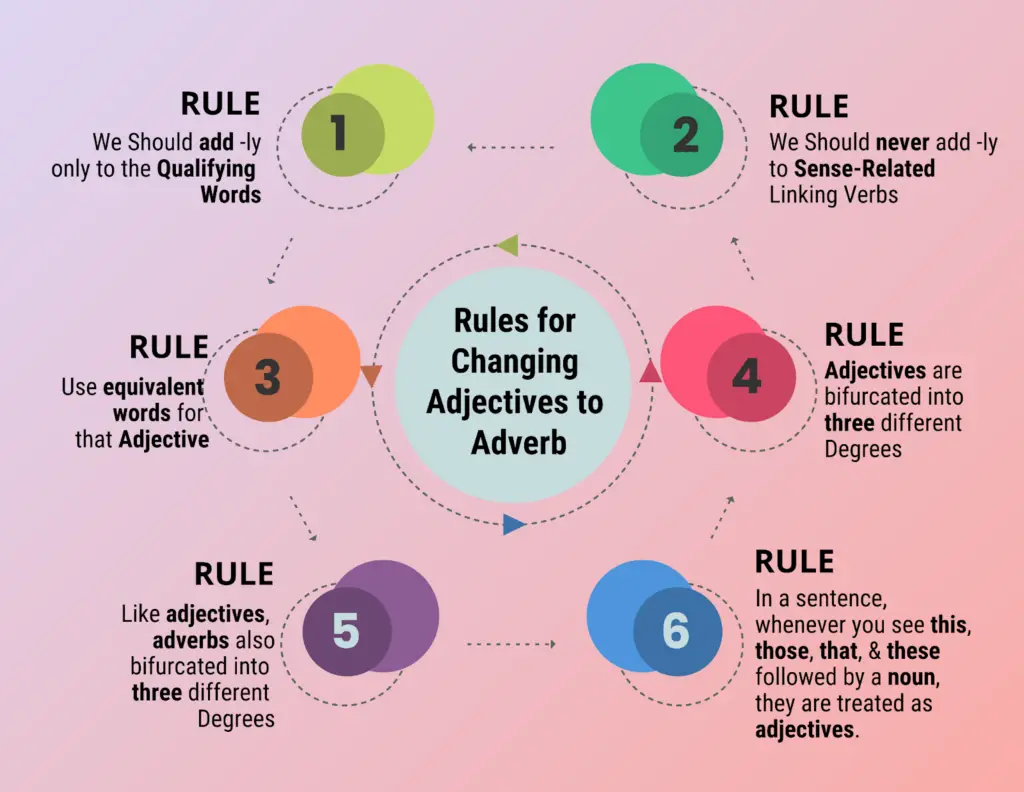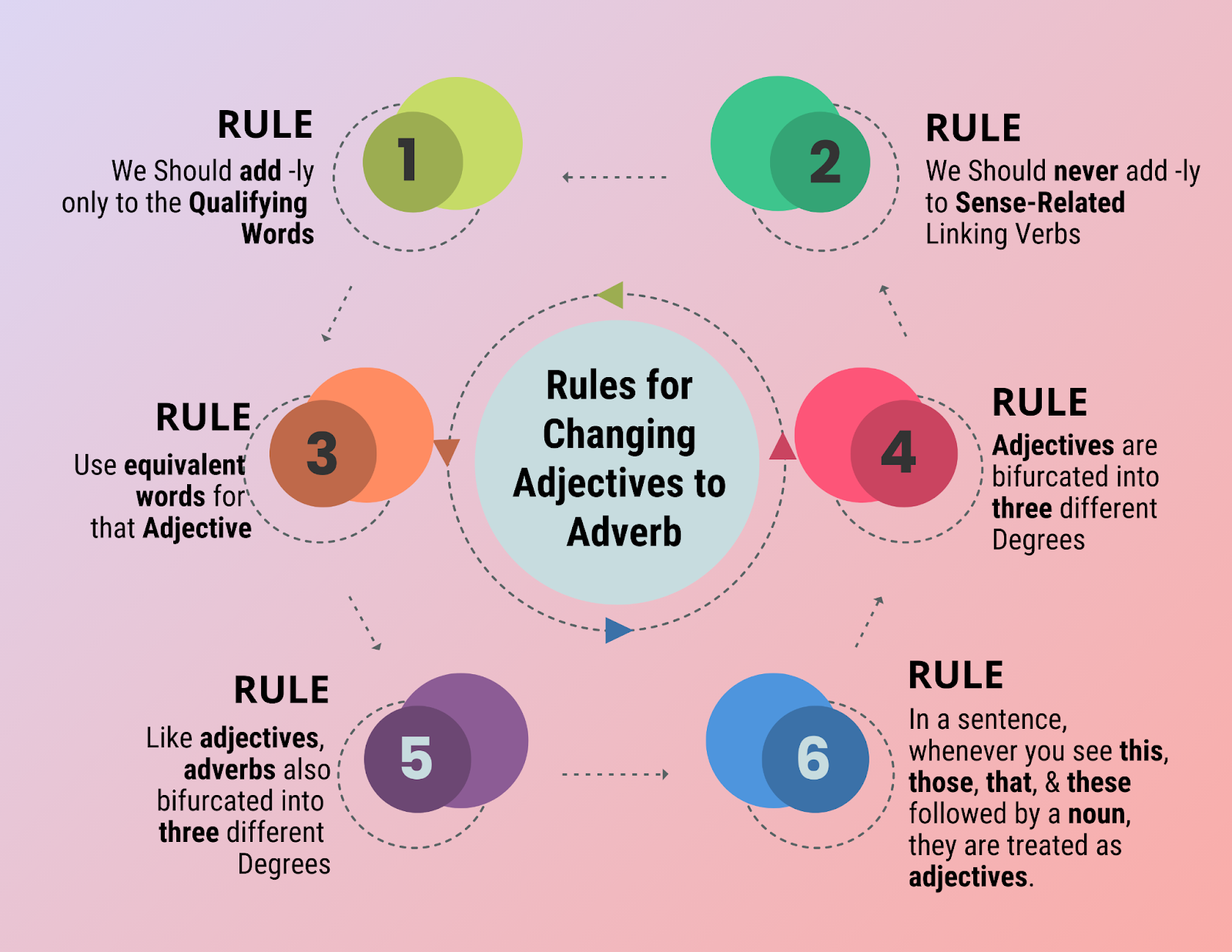Adjectives can be changed into adverbs by placing -ly at the ending of a particular word. For instance, the word slow can be changed into an adjective by adding ‘ly’ – ‘slowly’.
While an adjective is used to modify a noun or pronoun, an adverb is a part of speech which modifies a verb, an adverb or another adjective. Given the similar nature of both of these terms, people often confuse the first one with the latter.
In this blog post, we will be sharing:
- Types of adverbs and adjectives
- Adverb & adjective placement in a sentence
- How to change adjective into adverb
- Practice exercises
How are Most Adjectives Changed Into Adverbs?
- If an adjective already ends with -ly, then it cannot be changed into an adverb. In this case, we add a supportive word to lay emphasis on the adjective. Here are a few examples:
| Friendly | in a friendly way |
| Lively | in a lively way |
- Adverbs can also be formed by adding -ly at the end of the word. Few examples include:
| Close | Closely |
| Easy | Easily |
| Bad | Badly |
- In some cases, the modifier already ends in a -y, in this case, you need to swap it with an -ily in the end:
| Happy | Happily |
| Lazy | Lazily |
| Hungry | Hungrily |
- Any time there is a consonant followed by -le at the end of an adjective, drop the -e and replace it with a -y:
| Incredible | Incredibly |
| Terrible | Terribly |
| Comfortable | Comfortably |
Rules for Changing Adjectives into Adverbs

When making the distinction between an adjective and an adverb, always remember that adverbs answer the question of how, where, when, why, or to what extent an act has taken place.
Rule 1
We add -ly only to the qualifying words and avoid it wherever necessary. For instance:
The sentence ‘She thinks quick’ can be changed into ‘She thinks quickly’. In this particular case, we get the answer to the question: How does she think? However, when it comes to usage of words like fast, -ly will not be added since ‘fastly’ is grammatically incorrect. Here is another example:
Incorrect: She is a quickly thinker.
Correct: She is a quick thinker.
Rule 2
We should never add -ly to sense-related linking verbs since it is grammatically incorrect. Common examples include taste, smell, feel, look, etcetera. If you see these words being used, then it is better to use an adjective instead of an adverb. Here are a few examples:
- Incorrect: The flowers smell sweetly.
Correct: The flowers smell sweet.
- Incorrect: The inspector looked angrily to us.
Correct: The inspector looked angry to us.
Also Correct: The inspector looked at us angrily.
In the third case here, we use an adverb at the end of the sentence since the primary subject is directly interacting with the secondary subject (to us-at us).
- Incorrect: His mother felt badly about the news.
Correct: His mother felt bad about the news.
This case is an exception and worth keeping in mind. Since ‘mother’ here is not directly feeling/sensing something with her fingers, but rather metaphorically, we will not be using -ly at the end.
Rule 3
The adjective equivalent of the word ‘good’ is well. Furthermore, we always use the term ‘well’ instead of ‘good’ when talking about health. Examples are:
- You did a good job: Describes the job
You did the job well: This answers the question of how.
- The flowers smelled incredibly good: This sentence describes how the flowers smelled and not how one smells them with their nose, so we will be using the adjective form.
- You smell well for someone who hasn’t showered: In this case, we are actively using our nose, so the adverb ‘well’ will be used.
- I do not feel well: This emphasizes that the person is not feeling well health-wise whereas a sentence like ‘I do not feel good’ has a meaning which is open to the listener’s interpretation.
Rule 4
Adjectives are bifurcated into three different types: positive degree, comparative and superlative. The former two are used when comparing two or more subjects.
| Positive | Comparative | Superlative |
| Sweet | Sweeter | Sweetest |
| Efficient | More efficient | Most efficient |
| Big | Bigger | Biggest |
| Old | Older | Oldest |
| Confused | More confused | Most confused |
| Young | Younger | Youngest |
- When comparing two things, always use a superlative form. For example: This car is quicker than one of the two I own.
- When comparing 3 or more things, then go for a superlative degree. For example: He runs the fastest in the class. (We are comparing the subject with an entire class i.; more than 2, so a superlative degree is used.
Click here to know more about positive, comparative and superlative degrees.
Rule 5
Much like adjectives, adverbs are also divided into three types which are positive, superlative and comparative. When using adverbs, we apply the previous rule in the same manner and add an -ly when using the adverb in its comparative form.
Rule 6
In a sentence, whenever you see this, those, that and these followed by a noun, they are treated as adjectives. On the contrary, when the noun is absent, we simply treat them as pronouns. For example:
- This car is not for sale- Here this is followed by the noun car, so it is an adjective.
- This is for sale- Here the noun is missing, so this is just a pronoun.
Exercises
Which one of the following is correct:
- Come quickly or we will miss the movie
- Come quick or we will miss the movie
- I have never been more sure of anything.
- I have never been surer of anything.
He talks quite fast, isn’t it? In this sentence, the word ‘quite’ modifies:
- Verb
- Adjective
- Adverb
Answers: A A B
Summing Up
That was it on how to convert adjectives into adverbs. Given the English language is full of sneaky exceptions, mastering both of these terms will take some practice. Many renowned writers and publications advise new learners to steer away from adverbs, which seems like an impossible thing to do. In such a case, instead of using an adverb to give your sentence clarity, try looking for a stronger adjective instead. This will not only make your sentence less wordy, but also enhance your vocabulary.
Head over to https://englishtutorhub.com/ to learn more about the English language.


